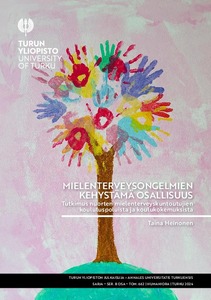Mielenterveysongelmien kehystämä osallisuus: Tutkimus nuorten mielenterveyskuntoutujien koulutuspoluista ja koulukokemuksista
Heinonen, Taina (2024-04-26)
Mielenterveysongelmien kehystämä osallisuus: Tutkimus nuorten mielenterveyskuntoutujien koulutuspoluista ja koulukokemuksista
Heinonen, Taina
(26.04.2024)
Turun yliopisto
Julkaisun pysyvä osoite on:
https://urn.fi/URN:ISBN:978-951-29-9663-6
https://urn.fi/URN:ISBN:978-951-29-9663-6
Kuvaus
ei tietoa saavutettavuudesta
Tiivistelmä
Tämä väitöstutkimus tarkastelee sitä, miten mielenterveyskuntoutujanuorten osallisuus rakentuu ja toteutuu sosiaalisissa suhteissa, koulussa ja mielenterveyspalveluissa sekä koulutuksessa ja työssä. Tutkimus osallistuu keskusteluun mielenterveyskuntoutujien sosiaalisesta ja yhteiskunnallisesta osallisuudesta, joka on tärkeä mielenterveyttä edistävä tekijä. Nuorten koulussa kokemaa osallisuutta pidetäänkin oleellisena tekijänä yksilön hyvinvoinnille. Siitä huolimatta mielenterveyskuntoutujien koulu-uran aikaisesta osallisuudesta ja siihen yhteydessä olevista tekijöistä on niukasti tietoa. Tutkimus perustuu kolmeen nuorten mielenterveyskuntoutujien koulutuspolkuja ja koulukokemuksia tarkastelevaan osatutkimukseen.
Tutkimus on monimenetelmällinen ja sen aineisto koostuu 18–25-vuotiaiden mielenterveyskuntoutujien haastatteluista (N=11), 18–34-vuotiaille mielenterveyskuntoutujille suunnatusta kyselystä (N=121) ja kyselyn kautta valittujen nuorten haastatteluista (N=28). Osatutkimuksia yhteen kokoavana analyyttisena näkökulmana toimii osallisuus. Analyysi osoittaa, miten mielenterveyden ongelmat usein kaventavat sosiaalisia suhteita ja korostavat yksilön resursseista johtuvia eroja. Analyysi tuo esille myös institutionaalisen tuen hajanaisuuden sekä kouluinstituution ja mielenterveyspalveluiden välisen yhteyden puuttumisen. Lisäksi tutkimus tekee näkyväksi sen, miten koulutukseen sitoutuminen ja työelämään siirtyminen ovat yhteiskunnan joustamattomien rakenteiden vuoksi mielenterveyskuntoutujille erityisen
haastavia.
Osallisuuden perusta ja mahdollisuudet rakentuvat lapsuudessa, perheissä, kouluympäristöissä ja yhteiskunnassa. Osallisuuden tukemiseksi ja edistämiseksi tarvitaankin koko elämänkaaren käsittäviä monialaisia toimia. Kouluympäristössä osallisuuden ja mielenterveyden tukemisen kannalta ensisijaisen tärkeää on tunnistaa ja tunnustaa sekä mielenterveysongelmiin että yksilön resursseihin ja tarpeisiin kytkeytyvät eriarvoisuutta tuottavat erot ja eronteot. Inclusion framed with mental health problems: Study on educational trajectories and school experiences of young people with a background of mental health problems
This dissertation examines how the inclusion of mental health rehabilitees is shaped and realized in social relationships, school and mental health services, and education and work. The study contributes to the discussion on the social and societal inclusion, which is a crucial factor in mental health. Furthermore, the inclusion of young people in school is considered important for their well-being. However, there is limited knowledge regarding the inclusion of people with mental health problems during their school career and the factors associated with it. The study is based on three substudies, which examine the educational trajectories and school experiences of young people with a background of mental health problems.
The study is multimethod and the data consists of three sets of sequentially collected data: interviews with 18–25 year olds with mental health problems (N=11), survey data from 18–34 year olds with mental health problems (N=121) and interviews with people selected through survey responses (N=28). The sub-studies are brought together through the analytical perspective of inclusion. The analysis demonstrates how mental health problems often limit social relationships and emphasize differences in individual resources. It also reveals the fragmentation of institutional support and the lack of connections between school institutions and mental health services. Additionally, the study illustrates how inflexible societal structures make it particularly challenging for individuals with mental health problems to engage in education and transition to work.
The foundations and opportunities for inclusion are established during childhood, within families, school environments and society. Therefore, multidisciplinary action is needed to support and promote inclusion throughout the life course. In the school environment, a key priority for promoting inclusion and mental health is to recognize and acknowledge the inequalities and differences that are associated with both mental health problems and individuals' resources and needs.
Tutkimus on monimenetelmällinen ja sen aineisto koostuu 18–25-vuotiaiden mielenterveyskuntoutujien haastatteluista (N=11), 18–34-vuotiaille mielenterveyskuntoutujille suunnatusta kyselystä (N=121) ja kyselyn kautta valittujen nuorten haastatteluista (N=28). Osatutkimuksia yhteen kokoavana analyyttisena näkökulmana toimii osallisuus. Analyysi osoittaa, miten mielenterveyden ongelmat usein kaventavat sosiaalisia suhteita ja korostavat yksilön resursseista johtuvia eroja. Analyysi tuo esille myös institutionaalisen tuen hajanaisuuden sekä kouluinstituution ja mielenterveyspalveluiden välisen yhteyden puuttumisen. Lisäksi tutkimus tekee näkyväksi sen, miten koulutukseen sitoutuminen ja työelämään siirtyminen ovat yhteiskunnan joustamattomien rakenteiden vuoksi mielenterveyskuntoutujille erityisen
haastavia.
Osallisuuden perusta ja mahdollisuudet rakentuvat lapsuudessa, perheissä, kouluympäristöissä ja yhteiskunnassa. Osallisuuden tukemiseksi ja edistämiseksi tarvitaankin koko elämänkaaren käsittäviä monialaisia toimia. Kouluympäristössä osallisuuden ja mielenterveyden tukemisen kannalta ensisijaisen tärkeää on tunnistaa ja tunnustaa sekä mielenterveysongelmiin että yksilön resursseihin ja tarpeisiin kytkeytyvät eriarvoisuutta tuottavat erot ja eronteot.
This dissertation examines how the inclusion of mental health rehabilitees is shaped and realized in social relationships, school and mental health services, and education and work. The study contributes to the discussion on the social and societal inclusion, which is a crucial factor in mental health. Furthermore, the inclusion of young people in school is considered important for their well-being. However, there is limited knowledge regarding the inclusion of people with mental health problems during their school career and the factors associated with it. The study is based on three substudies, which examine the educational trajectories and school experiences of young people with a background of mental health problems.
The study is multimethod and the data consists of three sets of sequentially collected data: interviews with 18–25 year olds with mental health problems (N=11), survey data from 18–34 year olds with mental health problems (N=121) and interviews with people selected through survey responses (N=28). The sub-studies are brought together through the analytical perspective of inclusion. The analysis demonstrates how mental health problems often limit social relationships and emphasize differences in individual resources. It also reveals the fragmentation of institutional support and the lack of connections between school institutions and mental health services. Additionally, the study illustrates how inflexible societal structures make it particularly challenging for individuals with mental health problems to engage in education and transition to work.
The foundations and opportunities for inclusion are established during childhood, within families, school environments and society. Therefore, multidisciplinary action is needed to support and promote inclusion throughout the life course. In the school environment, a key priority for promoting inclusion and mental health is to recognize and acknowledge the inequalities and differences that are associated with both mental health problems and individuals' resources and needs.
Kokoelmat
- Väitöskirjat [3073]
